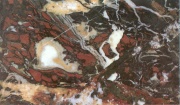Difference between revisions of "Africano marble"
Jump to navigation
Jump to search
m (Text replace - "== Authority ==" to "== Sources Checked for Data in Record ==") |
|||
| Line 7: | Line 7: | ||
lucelleum (lat.); Black of Chios; Marmo Africano Antico; marmor Chium ; mármol africano (Esp.); Afrikanischer Marmor (Deut.) | lucelleum (lat.); Black of Chios; Marmo Africano Antico; marmor Chium ; mármol africano (Esp.); Afrikanischer Marmor (Deut.) | ||
| + | ==Resources and Citations== | ||
| − | + | * Website: www.westminstercathedral.org.uk/art/art_marbles.html | |
| − | * Website | + | * Website: http://www.litosonline.com/articles/62/ar6201e.shtml |
| − | |||
| − | |||
* Janet Burnett Grossman, ''Looking at Greek and Roman Sculpture in Stone'', J. Paul Getty Trust, Los Angeles, 2003 | * Janet Burnett Grossman, ''Looking at Greek and Roman Sculpture in Stone'', J. Paul Getty Trust, Los Angeles, 2003 | ||
Revision as of 14:17, 24 April 2022
Description
A multicolored marble quarried in Turkey near Teos. Africano marble is black with spots of red, beige, white, and gray. It was used for decoration, especially in ancient Greek and Roman buildings. Africano marble was also used in Basilica of Saint Peter in Rome and Westminster Cathedral.
Synonyms and Related Terms
lucelleum (lat.); Black of Chios; Marmo Africano Antico; marmor Chium ; mármol africano (Esp.); Afrikanischer Marmor (Deut.)
Resources and Citations
- Website: www.westminstercathedral.org.uk/art/art_marbles.html
- Janet Burnett Grossman, Looking at Greek and Roman Sculpture in Stone, J. Paul Getty Trust, Los Angeles, 2003
